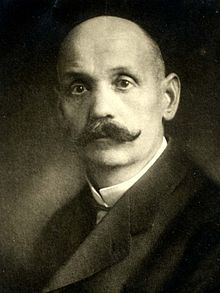Florian Groeger
Florian Gröger (born August 10, 1871 in Oberwildgrub , Austrian Silesia , † May 19, 1927 in Klagenfurt ) was an Austrian politician ( SPÖ) . He was born the seventh of 11 children to a poor shoemaker family and learned the trade of a weaver after finishing elementary school .
As a wandering craftsman, Gröger traveled to large parts of the Austro-Hungarian monarchy. 1890 traveled via Olmütz , Lundenburg and Vienna to Neufeld an der Leitha , where he worked in a textile factory. A few months later, he began to organize demonstrations by the workers there, but soon moved on again. After several trips between Vienna and Moravia , he developed from a politically active worker to a full-time party functionary. In 1897 he became party secretary in Czernowitz , but had to give up the position again due to lack of money in the local party section. After a stopover in Mährisch-Schönberg , he took over the editing of a newly founded social democratic newspaper in Brüx in 1898 . Due to the strict censorship of the time, his publishing activity resulted in several short prison sentences. From 1901 Gröger stayed several times in Carinthia , where he ultimately found his political home. However, he did not finally settle there until 1910. Before that, he ran several newspapers and district health insurance funds in Bohemia and Moravia in quick succession. In Klagenfurt he finally became state party secretary and editor of the newspaper Volkswille .
In 1911 by-elections to the Reichsrat election , he became a member of the Reichsrat in 1912 . In November 1918 he became a member of the provisional Carinthian state parliament and in the Lemisch I state government as deputy state administrator. In 1921 he was elected as the first socialist governor of Carinthia , but he only held this position briefly. After a narrow election result without a clear majority, Vinzenz Schumy (KBB) and Sylvester Leer (CS) were put to his side. Gröger was required to make decisions only in consensus with both of them, which undermined his office and brought with it great potential for conflict. The state government of Gröger therefore only lasted from July 22, 1921 to 1923.
Florian Gröger married his long-term partner Anna Gröger in 1904 , who moved in with him as the only female member of the Carinthian state parliament on November 11, 1918 - one day before the right to vote for women was resolved parallel to the proclamation of the Republic of German-Austria . He died in Klagenfurt in 1927 after a long, painful and incurable illness .
literature
- Groeger, Florian. In: Austrian Biographical Lexicon 1815–1950 (ÖBL). Volume 2, Verlag der Österreichischen Akademie der Wissenschaften, Vienna 1959, p. 67.
- Willhelm Wadl: Studies on the social mobility of journeymen in the 19th century. Florian Gröger - From the wandering linen weaver to the mobile party official . In: Carinthia I . 178th year. Klagenfurt 1988, p. 343-345 ( onb.ac.at ).
Web links
- Florian Gröger on the website of the Austrian Parliament
- Obituary for Florian Gröger: Arbeiterzeitung May 21, 1927
Individual evidence
- ↑ digi.archives.cz - Baptismal Register Oberwildgrub (Václavov u Bruntálu), Silesia, 1867–1892, page 22, 5th line
- ^ Dachs, Herbert; Dippelreiter, Michael; Schausberger, Franz: Radical phrase, electoral alliances and continuities. State election campaigns in Austria's federal states 1919 to 1932 (= publication series of the Research Institute for Political-Historical Studies of the Dr. Wilfried Haslauer Library No. 57 ). Böhlau, Vienna, ISBN 978-3-205-20498-5 , pp. 99 f . ( Google Books ).
- ↑ Obituary for Florian Gröger . In: Workers will . Graz May 21, 1921, p. 1 ( onb.ac.at ).
| personal data | |
|---|---|
| SURNAME | Groeger, Florian |
| BRIEF DESCRIPTION | Austrian politician and member of the National Council of the Social Democratic Workers' Party in German Austria |
| DATE OF BIRTH | August 10, 1871 |
| PLACE OF BIRTH | Oberwildgrub , Silesia |
| DATE OF DEATH | May 19, 1927 |
| Place of death | Klagenfurt |


